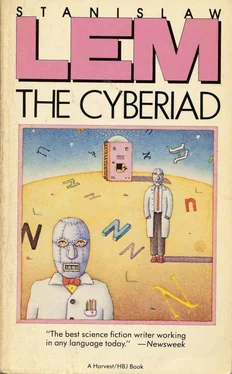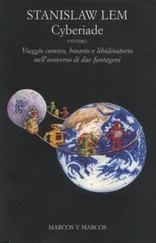Anyone else in Trurl’s place would have given up then and there, but our intrepid constructor was nothing daunted. He built a machine and fashioned a digital model of the Void, an Electrostatic Spirit to move upon the face of the electrolytic waters, and he introduced the parameter of light, a protogalactic cloud or two, and by degrees worked his way up to the first ice age—Trurl could move at this rate because his machine was able, in one five-billionth of a second, to simulate one hundred septillion events at forty octillion different locations simultaneously. And if anyone questions these figures, let him work it out for himself.
Next Trurl began to model Civilization, the striking of fires with flints and the tanning of hides, and he provided for dinosaurs and floods, bipedality and taillessness, then made the paleopaleface (Albuminidis sapienria), which begat the paleface, which begat the gadget, and so it went, from eon to millennium, in the endless hum of electrical currents and eddies. Often the machine turned out to be too small for the computer simulation of a new epoch, and Trurl would have to tack on an auxiliary unit—until he ended up, at last, with a veritable metropolis of tubes and terminals, circuits and shunts, all so tangled and involved that the devil himself couldn’t have made head or tail of it. But Trurl managed somehow, he only had to go back twice —once, almost to the beginning, when he discovered that Abel had murdered Cain and not Cain Abel (the result, apparently, of a defective fuse), and once, only three hundred million years back to the middle of the Mesozoic, when after going from fish to amphibian to reptile to mammal, something odd took place among the primates and instead of great apes he came out with gray drapes. A fly, it seems, had gotten into the machine and shorted out the polyphase step-down directional widget. Otherwise everything went like a dream. Antiquity and the Middle Ages were recreated, then the period of revolutions and reforms —which gave the machine a few nasty jolts—and then civilization progressed in such leaps and bounds that Trurl had to hose down the coils and cores repeatedly to keep them from overheating.
Towards the end of the twentieth century the machine began to tremble, first sideways, then lengthwise-—for no apparent reason. This alarmed Trurl; he brought out cement and grappling irons just in case. But fortunately these weren’t needed; instead of jumping its moorings, the machine settled down and soon had left the twentieth century far behind. Civilizations came and went thereafter in fifty-thousand-year intervals: these were the fully intelligent beings from whom Trurl himself stemmed. Spool upon spool of computerized history was filled and ejected into storage bins; soon there were so many spools, that even if you stood at the top of the machine with high-power binoculars, you wouldn’t see the end of them. And all to construct some versifier! But then, such is the way of scientific fanaticism. At last the programs were ready; all that remained was to pick out the most applicable—else the electropoet’s education would take several million years at the very least.
During the next two weeks Trurl fed general instructions into his future electropoet, then set up all the necessary logic circuits, emotive elements, semantic centers. He was about to invite Klapaucius to attend a trial run, but thought better of it and started the machine himself. It immediately proceeded to deliver a lecture on the grinding of crystallo-graphical surfaces as an introduction to the study of sub-molecular magnetic anomalies. Trurl bypassed half the logic circuits and made the emotive more electromotive; the machine sobbed, went into hysterics, then finally said, blubbering terribly, what a cruel, cruel world this was. Trurl intensified the semantic fields and attached a strength of character component; the machine informed him that from now on he would carry out its every wish and to begin with add six floors to the nine it already had, so it could better meditate upon the meaning of existence. Trurl installed a philosophical throttle instead; the machine fell silent and sulked. Only after endless pleading and cajoling was he able to get it to recite something: “I had a little froggy.” That appeared to exhaust its repertoire. Trurl adjusted, modulated, expostulated, disconnected, ran checks, reconnected, reset, did everything he could think of, and the machine presented him with a poem that made him thank heaven Klapaucius wasn’t there to laugh—imagine, simulating the whole Universe from scratch, not to mention Civilization in every particular, and to end up with such dreadful doggerel! Trurl put in six cliche filters, but they snapped like matches; he had to make them out of pure corundum steel. This seemed to work, so he jacked the semanticity up all the way, plugged in an alternating rhyme generator—which nearly ruined everything, since the machine resolved to become a missionary among destitute tribes on far-flung planets. But at the very last minute, just as he was ready to give up and take a hammer to it, Trurl was struck by an inspiration; tossing out all the logic circuits, he replaced them with self-regulating egocentripetal narcissistors. The machine simpered a little, whimpered a little, laughed bitterly, complained of an awful pain on its third floor, said that in general it was fed up, through, life was beautiful but men were such beasts and how sorry they’d all be when it was dead and gone. Then it asked for pen and paper. Trurl sighed with relief, switched it off and went to bed. The next morning he went to see Klapaucius. Klapaucius, hearing that he was invited to attend the debut of Trurl’s electronic bard, dropped everything and followed—so eager was he to be an eyewitness to his friend’s humiliation.
Trurl let the machine warm up first, kept the power low, ran up the metal stairs several times to take readings (the machine was like the engine of a giant steamer, galleried, with rows of rivets, dials and valves on every tier)—till finally, satisfied all the decimal places were where they ought to be, he said yes, it was ready now, and why not start with something simple. Later, of course, when the machine had gotten the feel of it, Klapaucius could ask it to produce poetry on absolutely whatever topic he liked.
Now the potentiometers indicated the machine’s lyrical capacitance was charged to maximum, and Trurl, so nervous his hands were shaking, threw the master switch. A voice, slightly husky but remarkably vibrant and bewitching, said:
“Phlogisticosh. Rhomothriglyph. Floof.”
“Is that it?” inquired Klapaucius after a pause, extremely polite. Trurl only bit his lip, gave the machine a few kicks of current, and tried again. This time the voice came through much more clearly; it was a thrilling baritone, solemn yet intriguingly sensual:
Pev’t o’ tay merlong gumin gots,
Untie yun furly pazzen ye,
Confre an’ ayzor, ayzor ots,
Bither de furloss bochre blee!
“Am I missing something?” said Klapaucius, calmly watching a panic-stricken Trurl struggling at the controls.
Finally Trurl waved his arms in despair, dashed clattering several flights up the metal stairs, got down on all fours and crawled into the machine through a trapdoor; he hammered away inside, swearing like a maniac, tightened something, pried at something, crawled out again and ran frantically to another tier. At long last he let out a cry of triumph, threw a burnt tube over his shoulder—it bounced off the railing and fell to the floor, shattering at the feet of Klapau-cius. But Trurl didn’t bother to apologize; he quickly put in a new tube, wiped his hands on a chammy cloth and hollered down for Klapaucius to try it now. The following words rang out:
Mockles! Fent on silpen tree,
Blockards three a-feening,
Mockles, what silps came to thee
In thy pantry dreaming?
Читать дальше












